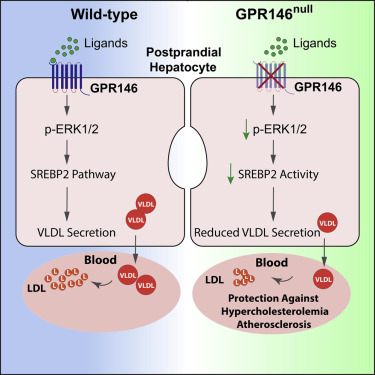
New Key Publication:GPR146 Deficiency Protects against Hypercholesterolemia and Atherosclerosis

- Yu H
- Rimbert A
- Palmer AE
- Toyohara T
- Xia Y
- Xia F
- Ferreira LMR
- Chen Z
- Chen T
- Loaiza N
- Horwitz NB
- Kacergis MC
- Zhao L
- BIOS Consortium
- Soukas AA
- Kuivenhoven JA
- Kathiresan S
- Cowan CA
Abstract: Although human genetic studies have implicated many susceptible genes associated with plasma lipid levels, their physiological and molecular functions are not fully characterized. Here we demonstrate that orphan G protein-coupled receptor 146 (GPR146) promotes activity of hepatic sterol regulatory element binding protein 2 (SREBP2) through activation of the extracellular signal-regulated kinase (ERK) signaling pathway, thereby regulating hepatic very low-density lipoprotein (VLDL) secretion, and subsequently circulating low-density lipoprotein cholesterol (LDL-C) and triglycerides (TG) levels.
Remarkably, GPR146 deficiency reduces plasma cholesterol levels substantially in both wild-type and LDL receptor (LDLR)-deficient mice. Finally, aortic atherosclerotic lesions are reduced by 90% and 70%, respectively, in male and female LDLR-deficient mice upon GPR146 depletion.
Taken together, these findings outline a regulatory role for the GPR146/ERK axis in systemic cholesterol metabolism and suggest that GPR146 inhibition could be an effective strategy to reduce plasma cholesterol levels and atherosclerosis.
- Link to the Paper in Cell: https://www.ncbi.nlm.nih.gov/pubmed/31778654
More news
-
15 September 2025
Successful visit to the UG by Rector of Institut Teknologi Bandung
